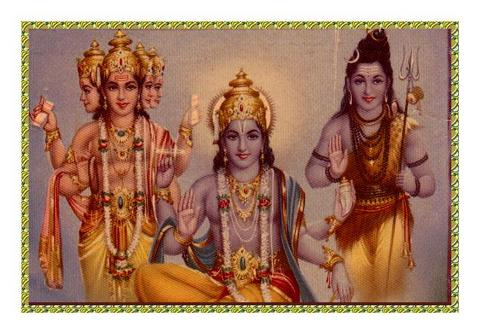Trimurti (Lords Brahma, Vishnu and Shiva) or Hindu Trilogy
The Holy Trimurti whom are commonly also known as the three forms of God personalized, or in religious circles also known as the Hindu Trilogy consist of cosmic powers personalized in the form of Lord Brahma the creator, Lord Vishnu the preserver, and Lord Shiva the destroyer.
|
Name: |
Brahma the creator, Vishnu the preserver, and Shiva the destroyer; the trinity make up The Holy Trimurti |
|
Birth, Age, Death: |
Since the creation of the physical universe |
|
Nationality: |
Mostly Indian |
|
Method/Religion started: |
Denomination of Hinduism, meditation |
|
Holy book/teachings: |
Vedas, Upanishads, Bhagavad Gita |
|
Followers: |
Hinduism has around 900 Million followers, with so many gods it’s difficult to know how many people only worship one or all of the trilogy. |
|
Lifestyle requirements: |
Simple life, vegetarian diet |
|
Form of practice: |
Mostly devotion, worship and meditation |
|
Wiki (encyclopedia) link: |
http://en.wikipedia.org/wiki/Trimurti |
Brahma is supposed to live for 100 of his years, at that time he dies and the entire causal plane is destroyed, waiting to be recreated again by the great Brahmin, Lord beyond causality. If you think about it, without Brahma we don’t exist. Yet, there are few temples dedicated to him, mostly Lords Vishnu and Shiva are worshipped.
- Matsya (fish) – recovers the Vedas from demons
- Kurma (tortoise) – sustains the earth on his back
- Varaha (boar) – brings the earth back from the bottom of the ocean
- Narasimha (man-lion) – kills the demon King Hiranyakashipu
- Vamana (dwarf) – the first human incarnation of the Lord
- Parasurama (the warrior with an axe) – saves Brahmins
- Rama (Lord) – kills Ravana, the demon king of Lanka.
- Sri Krishna (Lord) – the most popular incarnation
- Buddha (Lord) – Hindus accept his teachings, but do not worship him
- Kalkin – (a man on a white horse) – this incarnation is yet to come and will mark the end of all evil in the world.
There are endless verses on Shiva, his poetic majestic forms, his dances, his grace and his divine presence.
In a more practical manner, devotees visit temples, make offerings to pay respect, to meditate (although this is no longer common) and must adhere to a pure vegetarian diet.

